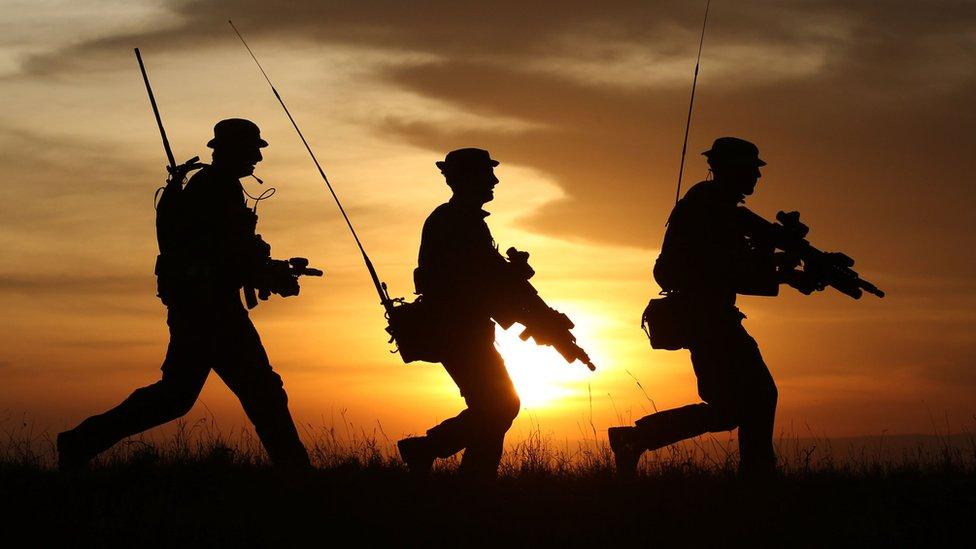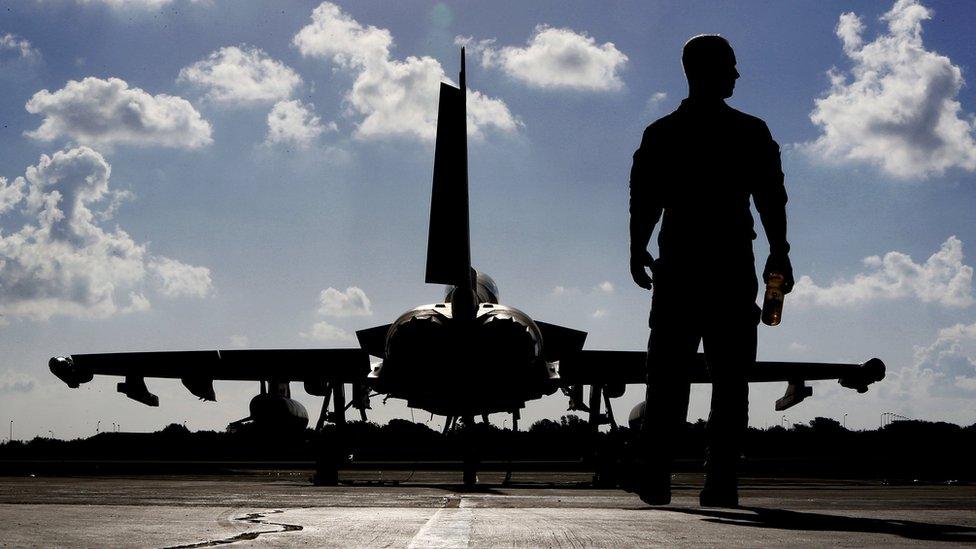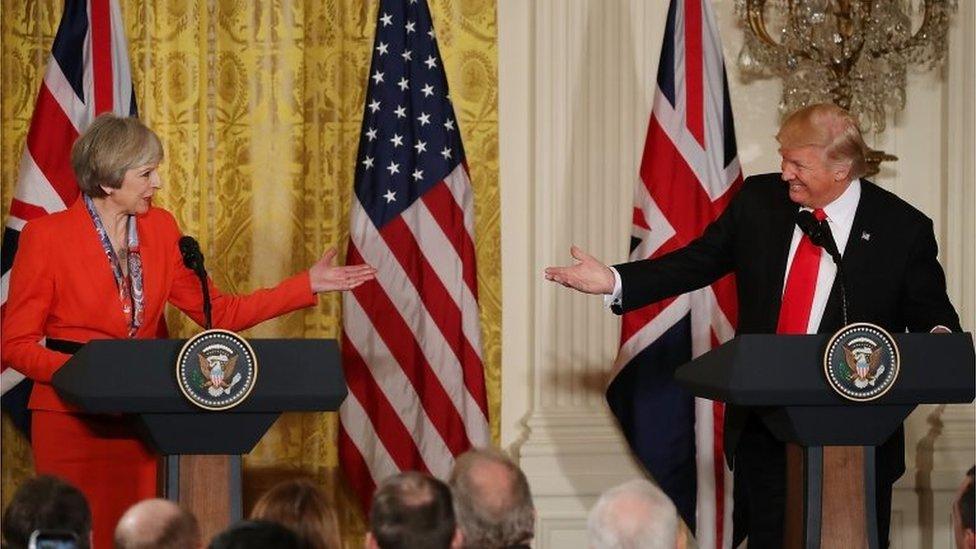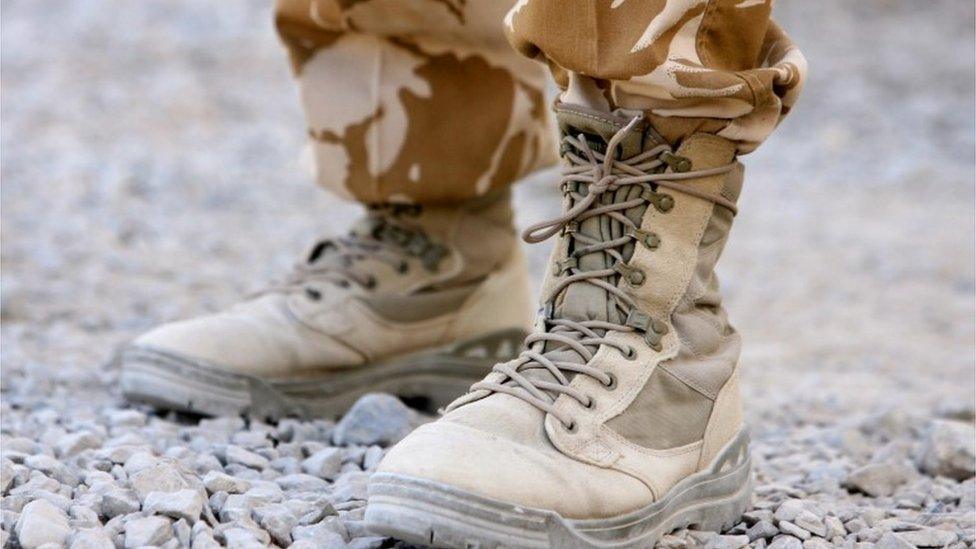Nato defence spending target met, government insists
- Published

Only a handful of countries currently meet the 2% Nato target
The government has rejected a think tank's claim that it missed Nato's target of spending at least 2% of national income on defence.
In a new report, external, the International Institute for Strategic Studies (IISS) claimed spending had fallen to 1.98% in 2016 as a result of the British economy growing faster than the defence budget.
But a Ministry of Defence spokesman said its figures were "wrong".
It pointed out that Nato itself said the UK met the 2% target.
A spokeswoman for the alliance confirmed five countries - the UK, US, Poland, Greece and Estonia, met its target, which was set in 2006, last year.
The UK has called on other countries to increase their spending, and US President Donald Trump has complained of European members failing to pay their fair share for collective defence arrangements.
In its report, the IISS said only Greece and Estonia spent 2% or more, with the UK falling short by about £380m.
Its researchers said there was "no shared understanding" of what constitutes a nation's defence expenditure, pointing out that Nato's definition includes not only defence ministry budgets but also pensions, expenditure for peacekeeping and humanitarian operations, and research and development costs.
They added that "very different results" could be reached depending on how expenditure is converted into US dollars and that different GDP figures could also distort the figures.
They also questioned the "increasingly prominent" role of the 2% figure, saying it "only provides a limited representation of countries' defence capabilities and commitments".
"Ultimately, it is the output that matters," they added.

An arbitrary target?
Jonathan Marcus, BBC defence correspondent

In some senses the 2% of GDP target for projected defence spending is an arbitrary benchmark - bound to fluctuate due to external economic factors, as today's row illustrates.
It was the level chosen to try to get the Europeans to up their game while not setting too difficult a target for countries already experiencing economic difficulties. Another benchmark - that countries should spend at least 20% of their defence budget on equipment - is perhaps more meaningful.
But some people argue that these arbitrary input targets are less important than "outputs" - exactly what real military capabilities countries are adding to Nato's force structure.
Nato says more spending is needed to counter what is seen as a growing Russian assertiveness, but also a variety of problems threatening Nato's southern flank.
And in the short term the need is to convince the new US administration and lawmakers on Capitol Hill that European allies are not seeking a cheap ride on America's purse strings.

The Ministry of Defence dismissed the think tank's assessment of the UK's spending.
"These figures are wrong," it said. "Nato's own figures clearly show that the UK spends over 2% of its GDP on defence.
"Our defence budget is the biggest in Europe, the second largest in Nato, and it is growing each year as we invest £178bn in new equipment and the UK steps up globally, with new ships, submarines and aircraft over the next decade."
The MoD said the IISS calculation may have been affected by fluctuations in exchange rates.
The think tank's report was released ahead of a meeting of Nato defence ministers in Brussels on Wednesday.
'Creative accounting'
At a press conference ahead of the summit, Nato secretary general Jens Stoltenberg unveiled figures showing that European members and Canada had between them increased defence spending by 3.8% above inflation last year.
Mr Stoltenberg said the figures were "significantly higher than what we had originally foreseen" and showed Nato had "turned a corner" after many years of steep cuts in spending.
He said: "Regardless of language, the most important thing is that we increase defence spending and that is exactly what we are doing."
MPs have previously questioned the way the UK government records its spending to meet the 2% target.
In April, the cross-party defence committee said including what is spent on intelligence gathering and war pensions could be seen as "creative accounting".
- Published27 January 2017

- Published21 April 2016
